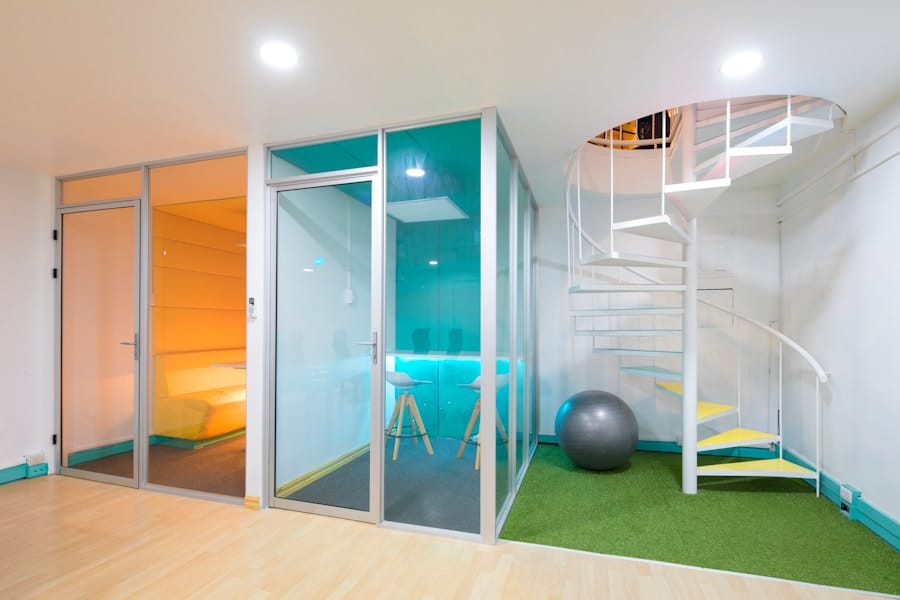In recent years, the landscape of mental health support has undergone a significant transformation, largely driven by the advent of technology and the increasing recognition of mental wellness as a critical component of overall health. Virtual mental wellness spaces have emerged as a vital resource for individuals seeking support, guidance, and community in their mental health journeys. These digital platforms range from teletherapy services to online support groups and wellness apps, providing a diverse array of options tailored to meet the unique needs of users.
The COVID-19 pandemic accelerated this trend, as social distancing measures forced many to seek alternatives to traditional in-person therapy and support systems. As a result, virtual mental wellness spaces have not only gained popularity but have also become essential lifelines for countless individuals navigating the complexities of mental health. The rise of these virtual spaces can be attributed to several factors, including the growing stigma surrounding mental health issues and the increasing demand for accessible resources.
Many individuals who may have previously hesitated to seek help due to societal pressures or personal fears are now finding solace in the anonymity and convenience offered by online platforms. Furthermore, the flexibility of virtual spaces allows users to engage with mental health resources at their own pace and on their own terms. This shift has led to a democratization of mental health support, where geographical barriers are diminished, and individuals from diverse backgrounds can access the help they need without the constraints of traditional healthcare systems.
Key Takeaways
- Virtual mental wellness spaces are on the rise, providing accessible support and resources from anywhere.
- These spaces allow individuals to connect with like-minded people and create a safe and inclusive environment for mental health discussions.
- Technology is being utilized to provide mental health support and overcome barriers to traditional services.
- Privacy and confidentiality are crucial in virtual spaces, emphasizing the importance of maintaining a safe and secure environment.
- The future of virtual mental wellness spaces looks promising, offering innovative solutions for mental health care.
Accessing Support and Resources from Anywhere
Accessibility and Convenience
This accessibility is particularly beneficial for individuals living in remote areas or those with mobility challenges who may find it difficult to attend in-person therapy sessions. With just an internet connection, users can connect with licensed therapists, participate in group discussions, or access a wealth of self-help resources tailored to their specific needs.
A Wealth of Resources
The variety of resources available in virtual spaces is vast and continually expanding. Users can find everything from guided meditation sessions and mindfulness exercises to educational webinars on coping strategies for anxiety and depression.
Personalized Growth and Empowerment
Many platforms also offer interactive tools such as trackers and journaling prompts that encourage personal growth. This wealth of information allows individuals to explore different aspects of their mental health at their own pace, making it easier to identify what works best for them. The ability to curate one’s own mental wellness experience is a powerful aspect of virtual spaces that traditional therapy settings often cannot provide.
Connecting with Like-Minded Individuals

Another compelling feature of virtual mental wellness spaces is the opportunity to connect with like-minded individuals who share similar experiences and challenges. Online support groups and forums create a sense of community that can be incredibly comforting for those grappling with mental health issues. Participants can share their stories, offer encouragement, and exchange coping strategies in a safe environment where they feel understood and validated.
This sense of belonging can significantly enhance an individual’s mental well-being, as it combats feelings of isolation that often accompany mental health struggles. The ability to connect with others from diverse backgrounds also enriches the experience within these virtual spaces. For instance, someone dealing with anxiety may find solace in hearing how others manage their symptoms or discover new techniques that resonate with them.
This exchange of ideas fosters a collaborative atmosphere where individuals can learn from one another, ultimately contributing to a more comprehensive understanding of mental health challenges. Source: Psychology Today
Creating a Safe and Inclusive Environment
Creating a safe and inclusive environment is paramount in virtual mental wellness spaces, as it directly impacts users’ willingness to engage and share their experiences. Many platforms prioritize establishing guidelines that promote respect, empathy, and confidentiality among participants. By fostering an atmosphere where individuals feel secure in expressing their thoughts and emotions without fear of judgment, these spaces encourage open dialogue about mental health issues.
This is particularly important for marginalized communities who may face additional barriers when seeking support. In addition to establishing ground rules for respectful communication, many virtual platforms actively work to ensure that their resources are inclusive and representative of diverse populations. This includes offering content that addresses various cultural backgrounds, gender identities, and sexual orientations.
By acknowledging the unique challenges faced by different groups, these spaces can provide tailored support that resonates with a broader audience. The commitment to inclusivity not only enhances the user experience but also reinforces the idea that mental wellness is a universal concern that transcends individual differences.
Utilizing Technology for Mental Health Support
The integration of technology into mental health support has opened up new avenues for individuals seeking assistance. Virtual mental wellness spaces leverage various technological tools to enhance user experience and engagement. For instance, many platforms utilize artificial intelligence (AI) to provide personalized recommendations based on users’ preferences and needs.
Chatbots equipped with AI capabilities can offer immediate responses to common inquiries or guide users through self-help exercises, ensuring that support is available around the clock.
Teletherapy sessions allow individuals to connect with licensed professionals from the comfort of their homes, eliminating barriers such as travel time and scheduling conflicts.
This flexibility not only makes therapy more accessible but also allows therapists to reach clients who may have previously been unable or unwilling to seek help due to logistical challenges. The use of technology in this manner has proven particularly effective during times of crisis, such as the COVID-19 pandemic, when many individuals faced heightened anxiety and uncertainty.
Overcoming Barriers to Traditional Mental Health Services

Breaking Down Stigma Barriers
One significant challenge many individuals face is the stigma surrounding mental health treatment, which can deter them from seeking help in person. The anonymity provided by online platforms allows users to explore their mental health concerns without the fear of being judged or labeled by others. This shift in perception can be transformative for those who have long struggled with feelings of shame or inadequacy related to their mental health.
Overcoming Financial Constraints
Financial constraints also pose a significant barrier to accessing traditional mental health services. Many individuals find therapy sessions prohibitively expensive or lack insurance coverage for mental health treatment. Virtual spaces often offer more affordable options, including sliding scale fees or subscription models that provide access to a range of resources at a lower cost than traditional therapy sessions.
Empowering Individuals
By making mental health support more financially accessible, these platforms empower individuals to prioritize their well-being without the burden of financial stress.
The Importance of Privacy and Confidentiality in Virtual Spaces
Privacy and confidentiality are paramount concerns when it comes to virtual mental wellness spaces. Users must feel confident that their personal information and shared experiences will remain secure and protected from unauthorized access. Reputable platforms prioritize data security by implementing robust encryption protocols and adhering to strict privacy regulations.
This commitment to safeguarding user information fosters trust between participants and service providers, encouraging more individuals to engage openly in discussions about their mental health. Furthermore, many virtual spaces emphasize the importance of informed consent when it comes to data collection and usage. Users are often provided with clear information about how their data will be used and have the option to opt out of certain data-sharing practices if they choose.
This transparency not only enhances user confidence but also reinforces the ethical responsibility of service providers in maintaining confidentiality within virtual environments.
The Future of Virtual Mental Wellness Spaces
As technology continues to evolve, so too will the landscape of virtual mental wellness spaces. The future promises even greater advancements in accessibility, personalization, and community engagement within these platforms. Innovations such as virtual reality (VR) therapy are already being explored as potential tools for immersive therapeutic experiences that can help individuals confront their fears or practice mindfulness in simulated environments.
Such developments could revolutionize how therapy is delivered, making it more engaging and effective for users. Moreover, as awareness around mental health continues to grow globally, we can expect an increase in collaboration between tech companies and mental health professionals to create comprehensive solutions that address diverse needs. This collaboration could lead to the development of more specialized platforms catering to specific populations or issues, such as trauma recovery or chronic illness management.
Ultimately, the future of virtual mental wellness spaces holds immense potential for enhancing access to care, fostering community connections, and promoting holistic approaches to mental well-being across various demographics.
In a related article, “The Best Niche for Affiliate Marketing in Pinterest”, explores how individuals can leverage the popular social media platform to promote products and earn commissions. Just as mental wellness spaces are emerging as virtual safe zones, affiliate marketing on Pinterest offers a unique opportunity for individuals to create their own safe and profitable online spaces. By tapping into the right niche, users can cultivate a supportive community and generate income through affiliate partnerships.
FAQs
What are mental wellness spaces?
Mental wellness spaces are virtual or physical environments designed to provide a safe and supportive space for individuals to focus on their mental health and well-being. These spaces may offer resources, activities, and support for individuals seeking to improve their mental wellness.
How are mental wellness spaces emerging as virtual safe zones?
With the rise of digital technology and online platforms, mental wellness spaces are increasingly being created in virtual environments. These virtual safe zones provide individuals with access to mental health resources, support groups, therapy sessions, and other tools to promote mental well-being from the comfort of their own homes.
What are the benefits of virtual mental wellness spaces?
Virtual mental wellness spaces offer convenience and accessibility for individuals who may not have access to traditional in-person mental health resources. These spaces can also provide a sense of anonymity and privacy for individuals who may feel more comfortable seeking support and guidance online.
What types of activities and resources are available in virtual mental wellness spaces?
Virtual mental wellness spaces may offer a variety of activities and resources, including online support groups, meditation and mindfulness sessions, educational workshops, access to mental health professionals through teletherapy, and self-help tools and resources for managing mental health challenges.
How can individuals access virtual mental wellness spaces?
Individuals can access virtual mental wellness spaces through various online platforms, websites, and mobile applications that are specifically designed to provide mental health support and resources. Many virtual mental wellness spaces are free to access, while some may require a subscription or membership fee for certain services.

